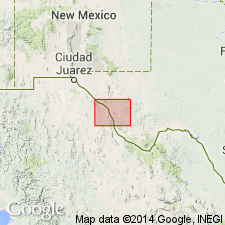
- Usage in publication:
-
- Tarantula Gravel
- Modifications:
-
- Areal extent
- AAPG geologic province:
-
- Permian basin
Summary:
Tarantula Gravel mapped southwest of the Van Horn Mountains, mostly in the area along the Rio Grande River, southernmost Culberson, westernmost Jeff Davis, and northwesternmost Presidio Cos, west TX, in Permian basin. [Author states that correlation of volcanic rocks from area to area on Marfa sheet is uncertain--little attempt is made to correlate between areas. The rocks are described by area.] Composition of Tarantula is related to rock types in nearby areas. Upper part: fragments of subrounded tuff, trachyte, basalt, and ignimbrite. Lower part: subrounded to rounded quartzite and limestone pebbles and cobbles probably derived from basal conglomerate of Colmena Formation. Thickness to approximately 400 ft. Shown on Correlation of Map Units as above Petan Basalt. Of Tertiary age [shown as younger than Oligocene, older than Quaternary]. Geologic map.
Source: GNU records (USGS DDS-6; Denver GNULEX).
For more information, please contact Nancy Stamm, Geologic Names Committee Secretary.
Asterisk (*) indicates published by U.S. Geological Survey authors.
"No current usage" (†) implies that a name has been abandoned or has fallen into disuse. Former usage and, if known, replacement name given in parentheses ( ).
Slash (/) indicates name conflicts with nomenclatural guidelines (CSN, 1933; ACSN, 1961, 1970; NACSN, 1983, 2005, 2021). May be explained within brackets ([ ]).

